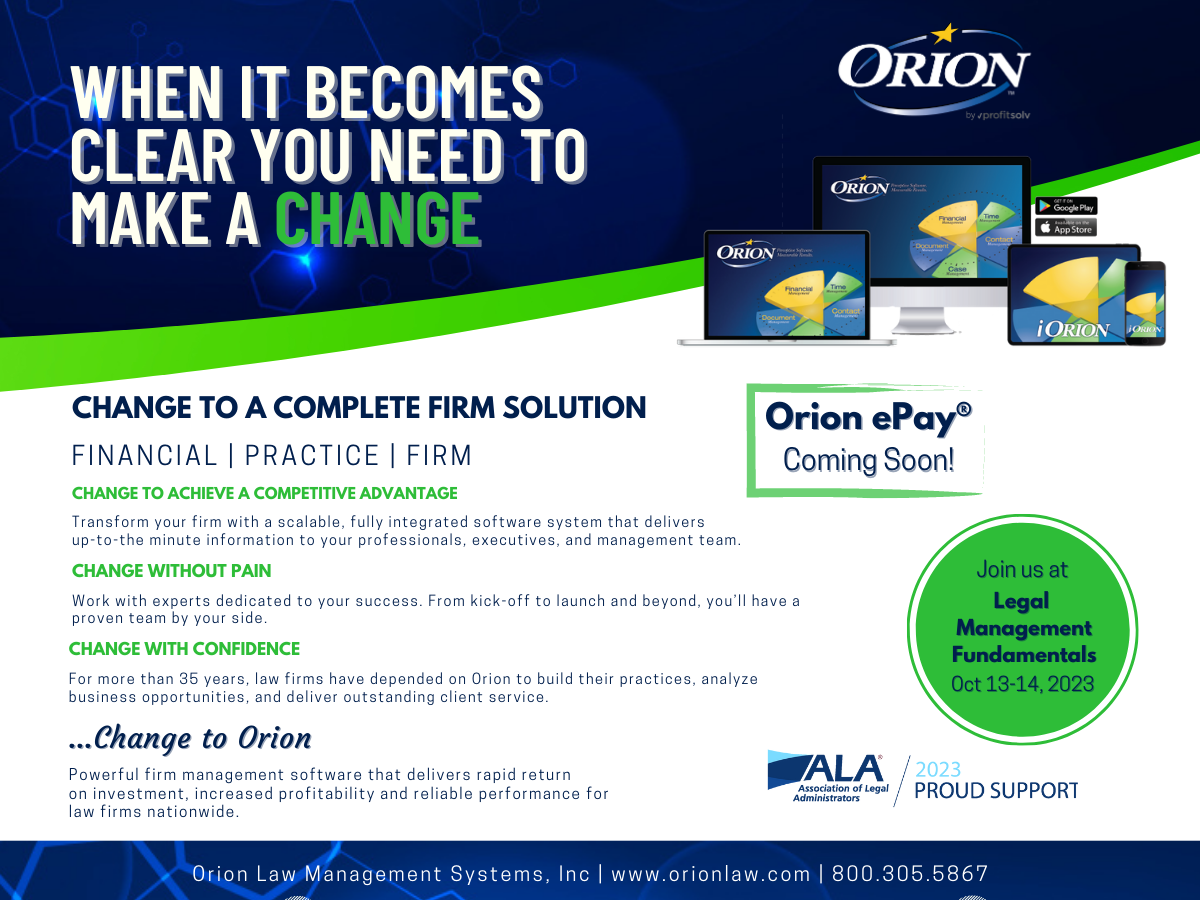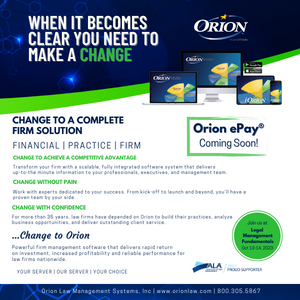To reduce attrition and hiring needs, legal industry employers need to know which specific elements will convince valued team members to stay — such as work-life balance, one of the primary reasons lawyers told legal tech provider Clio they planned to leave a job last year.
Today, a number of workforce members expect to be able to work remotely; a 2022 American Bar Association survey found 44% of attorneys would depart their current job to work for a new employer that provided more opportunities to telework.
Since the COVID-19 pandemic, Eagan Immigration — which previously let employees work from home a few days a week — has become a primarily remote law firm, aside from a small three-person office in the Washington, D.C. area.
The firm, which handles a range of immigration cases, has also been able to maintain a low turnover rate, which this year has stayed below 5%, according to HR Director Maddie Stough.
“We’ve had really great retention,” Stough says. “Because so many folks, at some point — especially in the legal field — spent part or all of 2020 and 2021 working from home, they know now that their jobs can be done remotely. The flexibility in our work schedules is something that really does help people have some balance. It’s a valued thing for a lot of folks — but there are other things we’ve been really proud to implement that have kept people engaged, too.”
ADDRESSING SELF-CARE CONCERNS
Eagan Immigration’s other employee-based initiatives include providing a number of free sessions a year with a counselor — which can be helpful, Stough says, as the cases firm members work on can be quite emotional.
“Because of the connection and time spent with our clients to understand and then tell their story, there’s a real potential, unfortunately, for secondhand trauma,” she says. “We also, in addition to our PTO days and other holidays, have mental health PTO days. Many of our folks wake up in the morning and say, ‘I couldn't stop thinking about that case from yesterday; I’ve just got to take the morning off,’ or ‘I need to take a day and just reset.’ Our team really values that.”
Eagan has also brought contact attorneys and paralegals on board at times when needed — something Robert Half’s research suggests can potentially raise morale. In its legal trends survey, more than 4 in 10 hiring managers said their retention issues stemmed primarily from inflated workloads and burnout.
Last year, 78% of lawyers and law firm and legal department managers said they were planning to hire more contract professionals in the first half of 2023.
“One of the things that’s super important to us is making sure our employees feel like they’re not being totally overloaded,” Stough says. “If we can balance out some of the work by bringing someone on even part-time as a contractor, that gives us a little bit of leeway. With immigration, there are ebbs and flows, and we want people to have vacations or maternity leave. It’s been a successful way for us to augment the staff.”
“Last year, 78% of lawyers and law firm and legal department managers said they were planning to hire more contract professionals in the first half of 2023.”
Lengea, a niche law firm that works with members of the nonreimbursable health care industry, such as med spas, has had a couple of employees leave in recent years. However, most of its seven attorneys and five legal support staff members have been in their roles for some time, according to Managing Partner Sara Shikhman.
The firm’s unlimited time-off policy, Shikhman says, has helped incentivize employees to stay. A number of firms now embrace an open-ended PTO approach, according to a 2022 law firm survey conducted by Aon — which found 62% of law firms offer a discretionary or flexible time-off option.
“If people want to take a month, or six weeks, we’re open to them doing that,” Shikhman says. “You could take off two months to travel or take a different bar exam or spend time with your family. If you find a way to have some other team members cover for you fully, then you are still paid for the time off — and if not, you could take unlimited unpaid time off for as long as you want.”
HELPING TO SHAPE EMPLOYEES’ FUTURES
Turnover activity has been low at Andrew Pickett Law, PLLC, since the firm — which employs two attorneys and four support staff members — established fixed career paths for employees, according to lead trial attorney Andrew Pickett. The outlined steps, Pickett says, and upskilling opportunities the firm supplies have been a big factor in its ability to retain talent.
“We created [the career paths] based on the experience and skills of our staff members and tailored them to their strengths and interests,” he says. “[An] example for our support staff could involve someone beginning as an entry-level paralegal, then [becoming] a legal assistant and finally taking on the office manager/paralegal role. Along the way, they would receive additional training and mentoring to help them develop their skills.”
Employees have responded positively to the educational assistance the firm offers, Pickett says. “Legal professionals take pride in developing their skills and expertise. We provide a variety of upskilling opportunities, such as workshops, seminars, online courses, conferences and certifications that our employees can take advantage of,” he says.
“We created [career paths] based on the experience and skills of our staff members and tailored them to their strengths and interests.”
In addition to a training curriculum that includes practice area-specific instruction, Goulston & Storrs sponsors a number of mentoring opportunities for younger associates — an operational element that law firm guide Chambers Associate cited when it named Goulston & Storrs one of the top 2023 law firms for associate retention.
Associates at the firm are paired with both a partner-level mentor, who is a director [partners are referred to as directors at the firm] within the firm, and an associate sibling, who’s able to answer any questions and offer guidance, according to the firm’s Chief Legal Talent Officer Karen Febeo. Both mentors participate in the firm’s Keys to Success program for junior associates, in conjunction with the firm’s Legal Talent team — which involves a monthly facilitated discussion on topics such as how to approach new assignments, manage their workload and understand expectations.
“When we hire associates, our goal is to help them grow, develop and succeed, and ultimately become a director with the firm,” Febeo says. “We have a low-leverage model. Associates are getting real-world experience, working directly with more senior attorneys and directors — it provides very meaningful and sophisticated work early on.”
GAUGING EMPLOYEE SENTIMENT
Law firms can utilize several methods to determine which specific job aspects will resonate with their employees. For instance, Pickett’s firm obtained input from firm members both in writing and face-to-face.
“We have conducted surveys and focus groups with our staff to understand their needs better,” he says. “Also, it [is] a good practice to keep an eye on industry trends and look for potential areas of improvement.”
An associate liaison committee that meets monthly at Goulston & Storrs acts as a conduit to convey questions and issues that associates raise. For example, the firm piloted a Feedback Fridays initiative in one of its practice areas based on an associate’s request for additional ways to encourage effective, real-time feedback.
“One of the best things law firms can do is meet employees where they are to find out what they want.”
“Firm leadership is very transparent and communicative with attorneys at all levels,” Febeo says. “Each month, the managing directors also meet with a small group of associates, as well as a small group of directors, to provide an opportunity for all attorneys to raise any questions, topics, concerns or areas of interest in an intimate setting that allows for open and candid discussion.”
Eagan has added three primary touch points throughout the year to survey staff about their work experience; along with an annual engagement survey in the fall as the firm begins to reconsider its benefits packages, it also conducts a pulse survey to see what features employees are still or might someday be interested in.
In the spring, Stough meets with firm members over the course of about six weeks for at least 30 minutes to discuss what they like about working at the firm and what they think could potentially be different — and to talk about any skills they’d like to improve.
One of the best things law firms can do, Stough says, is meet employees where they are to find out what they want.
“They honestly are very willing generally to tell you — and what they want is not always more money or more time off,” she says. “Asking your staff what they would like to see in an ideal employer, and then doing something with that information — not just taking it and sitting on it for six to eight months,” Stough says. Instead, she says to immediately respond to staff with what you’ll begin working on and let them know you appreciate their feedback. “Even that act is a great first step. Following through on it is really crucial.”


